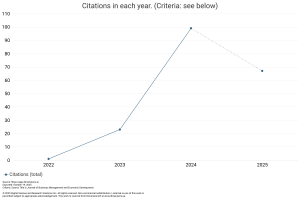Impact of Career Development and Leadership on Performance Employees with Job Loyalty as an Intervening Variable
DOI:
https://doi.org/10.59653/jbmed.v1i01.20Keywords:
Leadership, performance employee, work loyalty, career development, intervening variableAbstract
This study aims to determine whether career development and leadership have an impact on employee performance through work loyalty as an intervention variable or not. In this study, 100 respondents were used as a sample, calculated using the Slovin formula from 406 populations with a 5% margin of error. It collects data using a Likert scale and scores using a Questionnaire. The data analysis method used by researchers is a statistical test using SPSS version 23 using analytical techniques, classic assumption tests, path tests, coefficient of determination, and hypothesis testing. The results of this study suggest several steps that can be taken to improve performance among others by giving promotions to employees with good performance, the role of a leader who can arouse employee passion and obey and work loyally to improve employee performance.
Downloads
References
Alhalalmeh, M., Tarawneh, E. Al, & Eldahamsheh, M. (2023). Moderating Impact of Innovation Work Behaviour on the Relationship between Entrepreneurial Leadership and Competitive Advantage: An empirical study on Retail Industry of Jordan. International Journal of Economics and Business Research, 1(1). https://doi.org/10.1504/ijebr.2023.10041877
Alqudah, I. H. A., Carballo-Penela, A., & Ruzo-Sanmartín, E. (2022). High-performance human resource management practices and readiness for change: An integrative model including affective commitment, employees’ performance, and the moderating role of hierarchy culture. European Research on Management and Business Economics, 28(1). https://doi.org/10.1016/j.iedeen.2021.100177
Ángeles López-Cabarcos, M., Vázquez-Rodríguez, P., & Quiñoá-Piñeiro, L. M. (2022). An approach to employees’ job performance through work environmental variables and leadership behaviours. Journal of Business Research, 140. https://doi.org/10.1016/j.jbusres.2021.11.006
Ashiru, J. A., Erdil, G. E., & Oluwajana, D. (2022). The linkage between high performance work systems on organizational performance, employee voice and employee innovation. Journal of Organizational Change Management, 35(1). https://doi.org/10.1108/JOCM-02-2021-0039
Blustein, D. L., Erby, W., Meerkins, T., Soldz, I., & Ezema, G. N. (2022). A Critical Exploration of Assumptions Underlying STEM Career Development. Journal of Career Development, 49(2). https://doi.org/10.1177/0894845320974449
Cabrera, W., & Estacio, D. (2022). Job Attitude as a Factor on Employees Performance. International Journal of Economics Development Research (IJEDR), 3(1). https://doi.org/10.37385/ijedr.v3i1.254
Caissar, C., Hardiyana, A., Nurhadian, A. F., & Kadir, K. (2022). Pengaruh Motivasi Kerja Dan Disiplin Kerja Terhadap Kinerja Karyawan. Acman: Accounting and Management Journal, 2(1). https://doi.org/10.55208/aj.v2i1.27
Dhoopar, A., Sihag, P., Kumar, A., & Suhag, A. K. (2022). Organizational resilience and employee performance in COVID-19 pandemic: the mediating effect of emotional intelligence. International Journal of Organizational Analysis, 30(1). https://doi.org/10.1108/IJOA-06-2020-2261
Elci, M., Murat Eminoglu, G., & Teloren, I. (2023). SELF-LEADERSHIP TO MAKE EMPLOYEES GIVE THEIR BEST. Journal of Global Strategic Management, 15(2). https://doi.org/10.20460/jgsm.2022.300
Healy, M., Hammer, S., & McIlveen, P. (2022). Mapping graduate employability and career development in higher education research: a citation network analysis. Studies in Higher Education, 47(4). https://doi.org/10.1080/03075079.2020.1804851
Huang, X., Cao, J., Zhao, G., Long, Z., Han, G., & Cai, X. (2022). The Employability and Career Development of Finance and Trade College Graduates. Frontiers in Psychology, 12. https://doi.org/10.3389/fpsyg.2021.719336
Ibrahim, M., Saputra, J., Adam, M., & Yunus, M. (2022). Organizational Culture, Employee Motivation, Workload and Employee Performance: A Mediating Role of Communication. WSEAS Transactions on Business and Economics, 19. https://doi.org/10.37394/23207.2022.19.6
Jackson, K. M. (2023). Perceptions of leadership styles in international special and general education schools in the United Arab Emirates. Journal of Global Education and Research, 7(1). https://doi.org/10.5038/2577-509x.7.1.1211
Jnaneswar, K., & Ranjit, G. (2022). Explicating intrinsic motivation’s impact on job performance: employee creativity as a mediator. Journal of Strategy and Management, 15(4). https://doi.org/10.1108/JSMA-04-2021-0091
Kaltiainen, J., & Hakanen, J. (2022). Fostering task and adaptive performance through employee well-being: The role of servant leadership. BRQ Business Research Quarterly, 25(1). https://doi.org/10.1177/2340944420981599
Kasdorf, R. L., & Kayaalp, A. (2022). Employee career development and turnover: a moderated mediation model. International Journal of Organizational Analysis, 30(2). https://doi.org/10.1108/IJOA-09-2020-2416
Kazmi, S. W., & Javaid, S. T. (2022). Antecedents of organizational identification: implications for employee performance. RAUSP Management Journal, 57(2). https://doi.org/10.1108/RAUSP-02-2020-0017
Meng-Lewis, Y., Wong, D., Zhao, Y., & Lewis, G. (2022). Understanding complexity and dynamics in the career development of eSports athletes. Sport Management Review, 25(1). https://doi.org/10.1016/j.smr.2020.08.003
Nuzul Hidayat, M., & Sudirman, I. (2022). THE INFLUENCE OF MOTIVATION, CAREER DEVELOPMENT AND LEADERSHIP STYLE ON EMPLOYEE PERFORMANCE AT PT.PELABUHAN INDONESIA (Persero) REGIONAL 4 MAKASSAR. Hasanuddin Journal of Applied Business and Entrepreneurship (HJABE), 5(1).
Pinnington, A., Aldabbas, H., Mirshahi, F., & Pirie, T. (2022). Organisational development programmes and employees’ career development: the moderating role of gender. Journal of Workplace Learning, 34(5). https://doi.org/10.1108/JWL-08-2021-0103
Pio, R. J. (2022). The mediation effect of quality of worklife and job satisfaction in the relationship between spiritual leadership to employee performance. International Journal of Law and Management, 64(1). https://doi.org/10.1108/IJLMA-07-2018-0138
Refae, G. A. El, Farhan, W., Chaudhry, I., & Razmak, J. (2023). Exploring UAEs female leadership styles in the digital era: Motivators and barriers. International Journal of Economics and Business Research, 1(1). https://doi.org/10.1504/ijebr.2023.10045852
Sabir, I., Ali, I., Majid, M. B., Sabir, N., Mehmood, H., Rehman, A. U., & Nawaz, F. (2022). Impact of perceived organizational support on employee performance in IT firms – a comparison among Pakistan and Saudi Arabia. International Journal of Organizational Analysis, 30(3). https://doi.org/10.1108/IJOA-10-2019-1914
Stirpe, L., Profili, S., & Sammarra, A. (2022). Satisfaction with HR practices and employee performance: A moderated mediation model of engagement and health. European Management Journal, 40(2). https://doi.org/10.1016/j.emj.2021.06.003
Sunagawa, G., Yada, H., Odachi, R., & Adachi, K. (2022). The Effect of Nurses’ Characteristics and Motivation on the Development of Their Career Intentions. Journal of UOEH, 44(1). https://doi.org/10.7888/juoeh.44.35
Tetteh, J., & Asumeng, M. A. (2022). Succession planning, employee retention and career development programmes in selected organisations in Ghana. African Journal of Management Research, 27(1). https://doi.org/10.4314/ajmr.v27i1.9
Udin, U. (2023). Leadership Styles and Innovative Work Behavior: The Role of Work Engagement. International Journal of Economics and Business Research, 1(1). https://doi.org/10.1504/ijebr.2023.10045009
Wendling, E., & Sagas, M. (2022). Development and Validation of the Career Identity Development Inventory. Journal of Career Assessment, 30(4). https://doi.org/10.1177/10690727211063374
Downloads
Published
How to Cite
Issue
Section
License
Copyright (c) 2023 Lailatul Qodariyah

This work is licensed under a Creative Commons Attribution-ShareAlike 4.0 International License.
Authors who publish with this journal agree to the following terms:
- Authors retain copyright and grant the journal right of first publication with the work simultaneously licensed under a Creative Commons Attribution-ShareAlike that allows others to share the work with an acknowledgement of the work's authorship and initial publication in this journal.
- Authors are able to enter into separate, additional contractual arrangements for the non-exclusive distribution of the journal's published version of the work (e.g., post it to an institutional repository or publish it in a book), with an acknowledgement of its initial publication in this journal.
- Authors are permitted and encouraged to post their work online (e.g., in institutional repositories or on their website) prior to and during the submission process, as it can lead to productive exchanges, as well as earlier and greater citation of published work (See The Effect of Open Access).





























